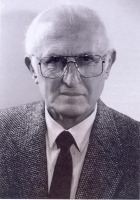Ezra Fleischer
This article needs to be updated. (January 2012) |
Ezra Fleischer | |
|---|---|
 | |
| Born | 7 August 1928 |
| Died | 25 July 2006 (aged 77) |
| Nationality | Israeli |
Ezra Fleischer (Hebrew: עזרא פליישר; 7 August 1928 – 25 July 2006) was a Romanian-Israeli Hebrew-language poet and philologist.
Biography[edit]
Fleischer was born in 1928 in Timișoara, in the Banat region of western Romania, and studied in the Jewish school that his father, Judah Loeb Fleischer, had founded in 1918.
After World War II, Fleischer was active in the Bnei Akiva movement in Romania and was imprisoned for his Zionist activities. While in prison, he wrote an Hebrew poem called, “Massa Gog,” in which he predicted the downfall of Communism. The poem was smuggled out of Romania and was published in Israel, under a pen name, where it caused somewhat of a “literary sensation”. Further books of poetry followed in Romania, all under a pen name.
In 1960, Fleischer emigrated to Israel, where he researched medieval Hebrew literature. He received a doctorate from the Hebrew University of Jerusalem, where he also subsequently lectured until 1997.
He was also the director of the Geniza Research Institute for Hebrew Poetry of the Israel Academy of Sciences and Humanities. His student Shulamit Elizur has succeeded him in this position.
His published work, most of it on poetry and prayer, covers a wide range of ancient and medieval Jewish life from Andalusia and Amsterdam to Syria and Cairo. He also wrote extensively about Judaism's encounter with Islam and Christianity.[1] At the beginning of his career in 1966, Fleischer published a comprehensive and profound critique on Menahem Zulai's book, The paytanic school of Rav Saadia Gaon, wherein Zulai had brought together and summarized his research on Rabbi Saadia Gaon. According to Professor Yosef Tobi, Fleischer occasionally found that there exists a direct influence from Saadia upon Spanish works, such as the integration of philosophical ideas in the liturgical poems composed by Joseph ibn Abitur and Solomon ibn Gabirol, the structure of the Spanish azharot and keter malkhut of Ibn Gabirol, the assignment of biblical verse as a linguistic model in poetry and alternating rhyme scheme (ABAB). However, in all these assertive statements, there is still some ambivalence and uncertainty, seeing that Fleischer is careful to point out that “the secular Hebrew poetry of Spain is not a continuation of pre-Spanish secular poetry, but rather a new formation in terms of its virtues and character: a faithful reflection, in principle, of Arabic secular poetry.”[2]
Awards[edit]
- In 1959, Fleischer was awarded the Israel Prize, for literature,[3] primarily for his poem “Massa Gog”.
- In 1971, he was given the Herzl Award for literature.
- In 1986, Fleischer was awarded the Bialik Prize for Jewish thought.[4]
- In 1992, he was awarded the Rothschild Prize, for Jewish studies.
Festschriften[edit]
- Ezra Fleischer Memorial Volume, ed. Shulamit Elizur [=Kobez Al Yad, vol. 25 (XXXV)] (Jerusalem: Mekizei Nirdamim, 2017; Hebrew)
- In Memory of Ezra Fleischer, ed. Mordechai Akiva Friedman (Jerusalem: Israel Academy of Sciences and Humanities, 2010; Hebrew)
- Knesset Ezra: Literature and Life in the Synagogue – Studies Presented to Ezra Fleischer, eds. Shulamit Elizur, Moshe David Herr, Gershon Shaked, and Avigdor Shinan (Jerusalem: Ben-Zvi, 1994; Hebrew)
See also[edit]
Further reading[edit]
- Hoffman, Adina & Cole, Peter (2011) Sacred Trash: The lost and found world of the Cairo Geniza
References[edit]
- ^ "Ezra Fleischer, Expert on Hebrew Poetry, Is Dead at 78". New York Times. August 1, 2006.
- ^ Yosef Tobi, in article entitled, "The Liturgical Work of Rav Saadia Gaon In the Research of Ezra Fleischer"
- ^ "Israel Prize recipients in 1959 (in Hebrew)". Israel Prize Official Site. Archived from the original on March 7, 2012.
- ^ "List of Bialik Prize recipients 1933–2004 (in Hebrew), Tel Aviv Municipality website" (PDF). Archived from the original (PDF) on 2007-12-17.
External links[edit]
- 1928 births
- 2006 deaths
- Judaic scholars
- Hebrew-language poets
- Israeli poets
- Romanian male poets
- Israel Prize in literature recipients
- Members of the Israel Academy of Sciences and Humanities
- Academic staff of the Hebrew University of Jerusalem
- Hebrew University of Jerusalem alumni
- Israeli Jews
- Romanian Jews
- Romanian dissidents
- Romanian emigrants to Israel
- Writers from Timișoara
- 20th-century Romanian poets
- 20th-century Israeli historians
- 20th-century Romanian male writers
- Burials at Har HaMenuchot
